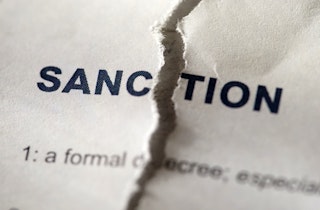Norway follows EU and imposes sanctions on Belarusian individuals.
New EU sanctions
Post the election in Belarus on 9 August 2020 reports from domestic observers indicated that the electoral process did not meet the international standards expected by an OSCE (Organisation for Security and Cooperation in Europe) participating state. The election results naming Aleksandr Lukashenko as the winner of the election, led to an outbreak of massive protests, claiming that the results were false and subject to electoral fraud. During these protests, the protestors have been exposed to disproportionate violence and arrests, and as such police brutality has become a main focus in the ongoing protests.
The situation was addressed by the European Council on 19 August 2020. The European Council made it clear that that it did not recognise the election results presented by the Belarus authorities, and that it was set to impose new restrictive measures against the state. On 2 October 2020, the European Council imposed such restrictive measures, aimed at designated individuals responsible for the violent repression and intimidation of peaceful demonstrators, opposition members and journalists, and election falsification. On 6 November 2020 these measures were expanded to cover 15 additional Belarus individuals responsible for ongoing repression, including president Aleksandr Lukashenko. In a third instalment, the European Counsel has on 17 December 2020 extended the measures to cover an additional 29 individuals and 7 entities.
The restrictive measures include a travel ban and an asset freeze for the designated individuals and entities. While the travel ban prohibits individuals from travelling through the EU, the asset freeze aims to limit the economic resources of the individuals and entities.
Norway implements the EU sanctions
EU restrictive measures are implemented in Norway through national regulations with legal basis in the Act on Implementation of International, Non-military Measures (unofficial translation) dated 27 April 2001, number 14 (the "Sanctions Act").
As stated in the preparatory works of the Sanctions Act, it is a fundamental principle of Norwegian sanction legislation that generally accepted international sanctions should be swiftly processed and implemented into national legislation (as regulations rather than acts) in order to achieve the desired results. While the EU sanctions against Belarus represent such generally accepted international sanctions, they also target the head of a state – and may have great implications for Norwegian foreign policy. As such, it was decided that the matter of implementing restrictive measures against Belarus head of state Aleksandr Lukashenko would be handled by the government in cabinet.
In a press release issued on 20 November 2020, the Norwegian government stated that it had been decided in a royal decree that Norway would adhere to the EU sanctions imposed against Belarus' head-of-state, Aleksandr Lukashenko.
On 6 January 2021, the Norwegian government has announced that it also joins the third instalment of EU restrictions against Belarus.
This means that the 88 listed individuals, including Aleksandr Lukashenko, will be denied entry into Norway, and that any assets these individuals and the 7 entities may hold in Norway (such as bank accounts or property) will be frozen. Norwegian entities are obliged to investigate whether they hold any such assets, and findings should be reported to the Ministry of Foreign Affairs in accordance with a guidance (Norwegian: Frysveilederen) issued by the Ministry of Foreign Affairs and the Norwegian Financial Supervisory Authority.
Historically on sanctions against Belarus
Restrictive measures against certain officials of Belarus have been in place in the EU since 24 September 2004. The measures were initially imposed against alleged key persons involved in the disappearance of four well-known individuals in Belarus in 1999-2000. Additional restrictive measures were imposed in June 2011 in connection with violations of international election standards and the incarceration of persons demonstrating against the country's leading political party. However, most of the targeted measures were later suspended, and subsequently lifted on 25 February 2016.

 Andreas Meidell
Andreas Meidell
